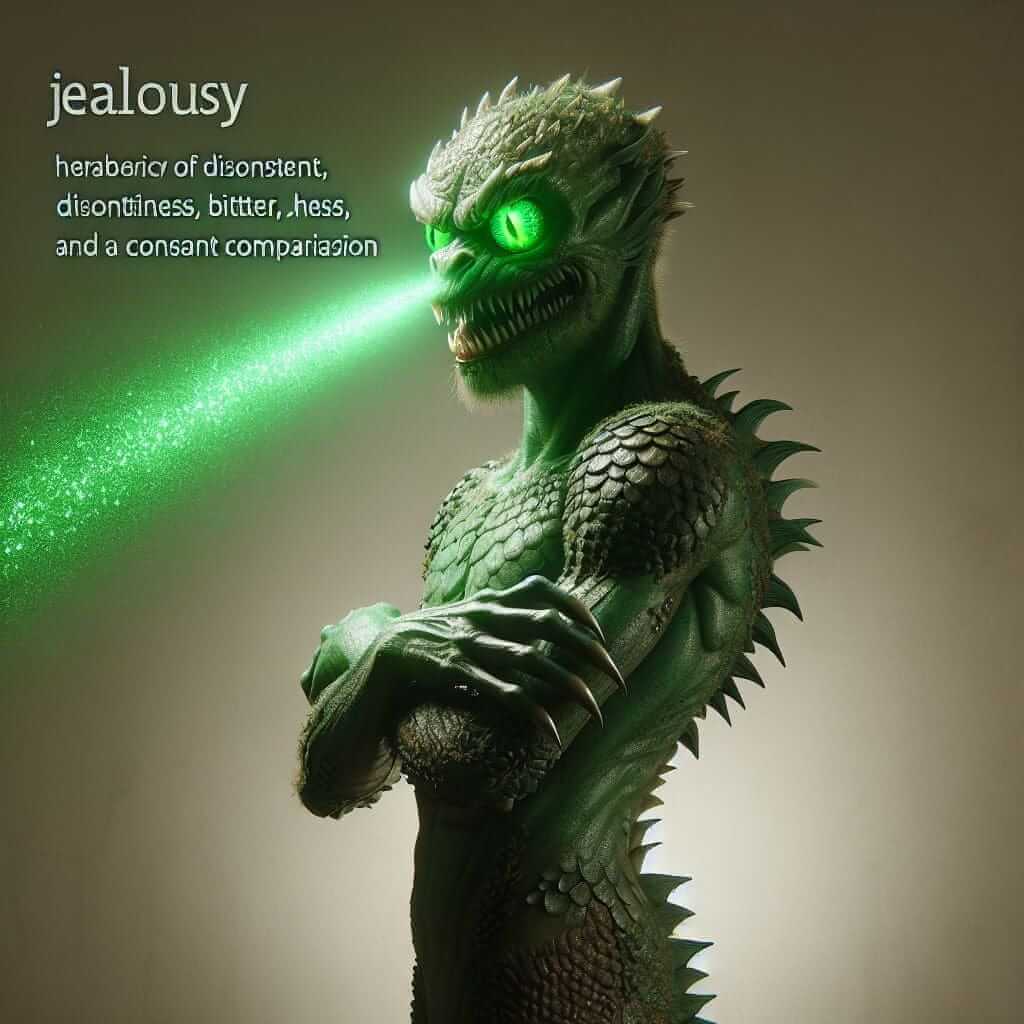The phrase “green-eyed monster” is a vivid metaphor widely used in English to describe the emotion of jealousy. In your IELTS preparation, understanding idiomatic expressions and their usage can enhance both your Writing and Speaking scores. This article will delve into the use of “green-eyed monster,” its synonyms, antonyms, and related expressions, offering in-depth analysis and practical examples to ensure you can use this vocabulary effectively in the IELTS exam.
Exploring the Meaning of “Green-eyed Monster” and Related Vocabulary
The green-eyed monster [ɡriːn-aɪd ˈmɑːnstər], a noun phrase, is a metaphor for jealousy. It suggests that jealousy can consume a person much like a monster.
Synonyms:
- Envy /ˈen.vi/ (noun): A feeling of wanting what someone else has.
- He couldn’t hide his envy of her success.
- Covetousness /ˈkʌv.ɪ.təs.nəs/ (noun): An intense desire to possess something belonging to someone else.
- Her covetousness for her neighbor’s car was obvious to everyone.
- Spitefulness /ˈspaɪt.fəl.nəs/ (noun): Malicious desire to harm or upset someone.
- His spitefulness was apparent when he spread rumors about his coworker.
- Resentment /rɪˈzent.mənt/ (noun): Bitter indignation at having been treated unfairly.
- They felt resentment towards their boss for the unjust criticism.
- Grudge /ɡrʌdʒ/ (noun): Persistent feeling of ill will after a perceived wrong.
- She held a grudge against her friend for years.
Antonyms:
- Contentment /kənˈtent.mənt/ (noun): A state of happiness and satisfaction.
- She sighed with contentment as she finally achieved her dreams.
- Generosity /ˌdʒen.əˈrɒs.ə.ti/ (noun): The quality of being kind and generous.
- His generosity in sharing his wealth has helped many people.
- Goodwill /ɡʊdˈwɪl/ (noun): Friendly, helpful, or cooperative feelings or attitude.
- The festival fostered goodwill among the community members.
- Selflessness /ˈsɛlf.ləs.nɪs/ (noun): Concern more with the needs and wishes of others than with one’s own.
- Her selflessness was evident in her volunteer work.
- Altruism /ˈæl.tru.ɪ.zəm/ (noun): The belief in or practice of disinterested and selfless concern for the well-being of others.
- His altruism led him to donate most of his fortune to charity.
The Significance of Vocabulary in IELTS
Understanding how to use and recognize idiomatic expressions such as “green-eyed monster” can significantly enhance your ability to comprehend and generate nuanced, sophisticated English. IELTS exams often test your capacity to understand and use such vocabulary, especially in the Writing and Speaking sections.
Example in IELTS Writing:
- Task 2: “Some people believe that excessive desire for material wealth leads to negative outcomes. To what extent do you agree or disagree with this statement?”
- Excessive desire often conjures the green-eyed monster, leading to envy and discontent among individuals.
Example in IELTS Speaking:
- Part 2: “Describe a time when you felt jealous of someone.”
- I once felt the green-eyed monster when my colleague received a promotion I had been hoping for.
Expressing Emotions in IELTS Listening:
- Listening tasks may include passages where speakers describe feelings indirectly.
- “He couldn’t help but feel the green-eyed monster rise within him when he saw his friend’s new car.”
Reading Comprehension:
- Reading passages might feature nuanced vocabulary.
- “The novel explores complex themes of envy and human emotion, often personifying jealousy as a green-eyed monster.”
 illustration of green-eyed monster
illustration of green-eyed monster
Idiomatic Expressions Related to Jealousy
1. To be green with envy:
- Meaning: Extremely jealous; used to describe someone visibly affected by jealousy.
- She was green with envy when she saw her friend’s brand new phone.
2. Sour grapes:
- Meaning: When someone disparages something they cannot have.
- His dismissal of the expensive car as unnecessary was just sour grapes.
3. The grass is always greener on the other side:
- Meaning: When someone believes other people’s situations are better than their own.
- She always thought the grass was greener on the other side until she experienced the reality herself.
4. Keep up with the Joneses:
- Meaning: Trying to match the lifestyle and possessions of one’s neighbors or peers.
- Trying to keep up with the Joneses leads many into unnecessary debt.
5. Envy eats nothing but its own heart:
- Meaning: Jealousy is ultimately self-destructive.
- Remember, envy eats nothing but its own heart, so try to focus on your own progress.
Practical Tips for IELTS
- Incorporate idioms and expressions: Using idiomatic expressions like “green-eyed monster” can make your language sound more natural and sophisticated.
- Understand the context: Make sure you use these expressions in the right context to convey the intended meaning.
- Practice in writing and speaking: Regular use in practice essays and speaking responses will help you remember and use these phrases more effectively.
Example in Writing Task 2:
- Question: “To what extent does advertising influence our lives?”
- Advertising often awakens the green-eyed monster within us, making us crave products we don’t need.
Example in Speaking Part 3:
- Question: “Do you think people are more envious nowadays compared to the past?”
- I believe the proliferation of social media has exacerbated feelings of envy, with the green-eyed monster appearing more frequently in our lives.
Conclusion
Understanding and applying idiomatic expressions like “green-eyed monster” can significantly boost your performance in IELTS. Always remember to use these phrases appropriately and practice them in different contexts to enhance your fluency and accuracy. Incorporating such vivid language into your responses can set you apart and demonstrate a higher level of English proficiency.
Now, take the time to practice and incorporate these expressions into your speaking and writing to ensure you’re ready for any challenge the IELTS exam might present.


